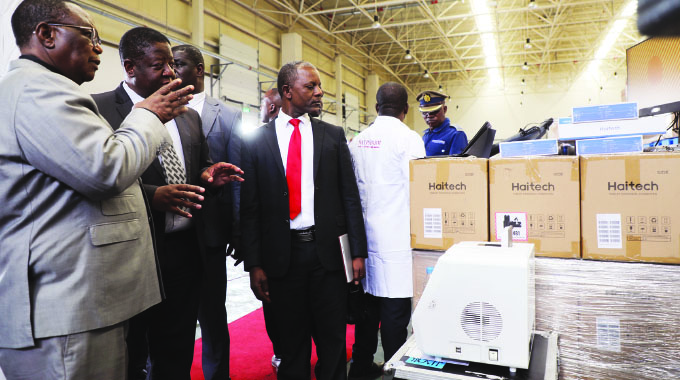Acting President Dr Constantino Chiwenga yesterday commissioned state-of-the-art medical equipment in Harare worth over US$12 million which is expected to transform the country’s health delivery system.
The equipment, procured by Government and its development partners, includes x-ray machines, bedside monitors, defibrillators, ventilators, stretcher beds, eight tonne refrigerated trucks, wheelchairs and service buses will be distributed to various health centres countrywide.
Commissioning the equipment at the National Pharmaceutical Company (Natpharm) warehouse in Harare, which was recently built through a grant from China, Dr Chiwenga, who doubles as the Minister of Health and Child Care, said the new medical equipment would make the country’s health system more efficient.
“Government considers medical equipment as a fundamental component in the health delivery system in the country,” Dr Chiwenga said.
“We are all aware that there are several benefits derived as they are important to prevent, diagnose, treat, and rehabilitate illnesses and disease in a safe and effective way. Such an enabling environment will accelerate the attainment of a prosperous and empowered upper-middle income society by 2030.”
Dr Chiwenga said the procurement of medical equipment was a continuous exercise which would be religiously taken by the Government and its development partners.
“We are cognisant that the equipment has a life span and therefore expires, new disease patterns and the ever expansion of health facilities demand new equipment,” he said.
“The National Development Strategy 1 and the National Health Strategy prioritised the provision of adequate medical equipment.”
The five new eight-tonne service trucks, 44-seater staff buses and three other 15-tonne service trucks were all assembled locally to facilitate the work of the Ministry of Health and Child Care.
Dr Chiwenga said the latest would go a long way in addressing the needs for the health and well-being cluster in the National Development Strategy 1.
Ms Ruth Kaseke, the chair of the Natpharm board, praised the Government’s plan to cover all health department obligations in advance..
“We would like to take the opportunity to appreciate the strategy by the Ministry of Health and Child Care of advance funding of ministry requirements,” she said.
“Under this strategy, MoHCC availed $4 billion for the procurement of medicines and NatPharm has concluded delivery contracts and is at various stages of taking deliveries of medicines.
“Honourable Acting President and Minister Sir, we have since submitted requirements for the procurement of the next batch medicines and we want to thank you in advance because as usual we know you will support your entity.”
Ms Kaseke assured all stakeholders that they were going to safeguard the delivery trucks, buses and medical equipment received.
Japan’s Ambassador to Zimbabwe, Mr Satoshi Tanaka, commended Zimbabwe for its robust efforts in improving the health sector.
“Allow me to once again commend the Ministry of Health and Child Care, as well as the UN agencies, for your efforts to improve Zimbabwe’s health sector,” he said. “Japan is committed to supporting the sustainable and inclusive development of Zimbabwe and one of our priority areas is supporting the health sector to achieve universal health coverage.”
The acting UN resident coordinator, who is Unicef country representative, Dr Tajudeen Oyewale, said the commissioning of medical equipment was a testimony to the strong partnerships that the Government of Zimbabwe has been pursuing to advance the achievements under the National Development Strategy (NDS-1).
“Working together, the UN Development in Zimbabwe is committed to continued technical and financial support to strengthen and support national institutions and deliver on key results on people, planet, prosperity and peace as articulated in the UN Sustainable Development Cooperation Framework with the Government of Zimbabwe,” Dr Oyewale said.
He commended Zimbabwe for registering significant progress in fighting malaria morbidity, HIV prevalence as well as attaining the World Health Organisation standard for tuberculosis (TB) treatment success rate.
Various development partners that include the African Development Bank, China, Japan, the United Nations among others, contributed to the procurement of various medical equipment with a huge chunk coming from the Government.
The Second Republic continues to receive unwavering external support as its investor-friendly policies, backed by the robust re-engagement and engagement drive, continue to bear fruits with many partners keen to pour their money into Zimbabwe.

